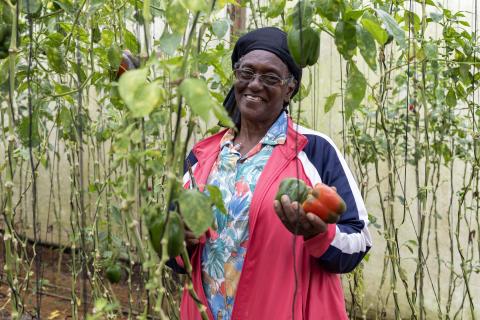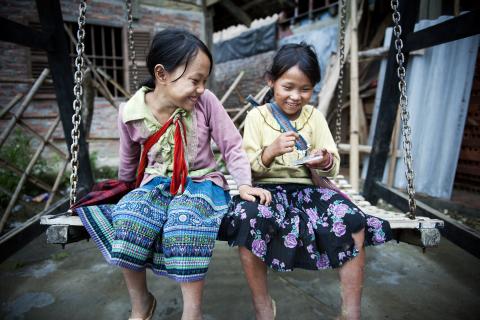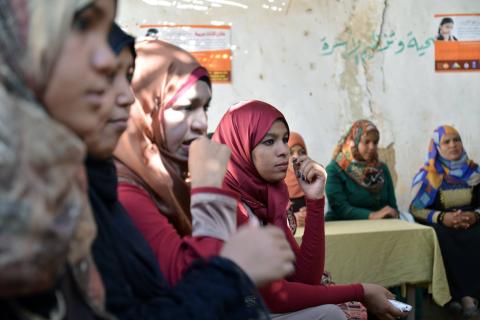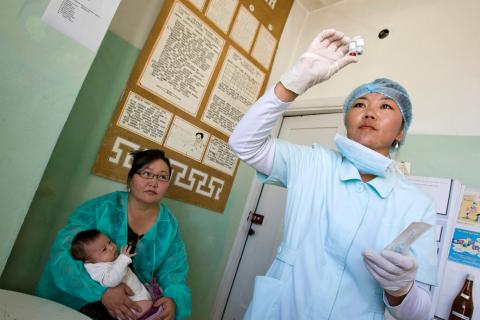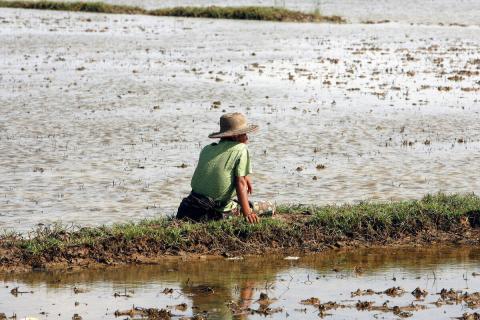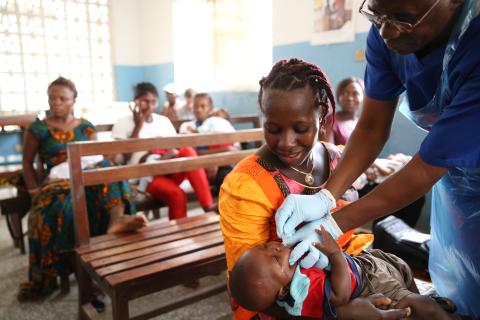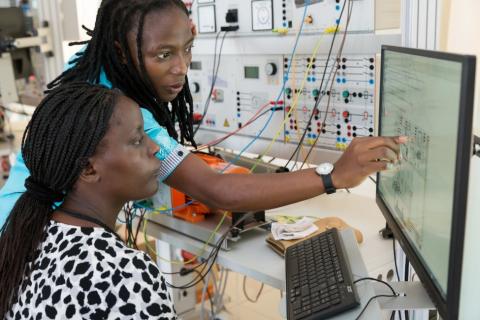UN DESA Policy Brief No. 184: The erosion of trust: A threat to social progress
Trust is central for societies, the State, and markets to function. It is key to building and maintaining social cohesion, as it promotes cooperation between groups of people as well as between people and the State. Trust is also fundamental to foster international cooperation and achieve the SDGs. However, evidence shows that trust in institutions is in crisis: more than half of the world’s population reports little or no trust in their government. Restoring people’s trust is essential to repair the social fabric, mitigate rising polarization, accelerate social progress and achieve global goals.
UN DESA Policy Brief No. 183: Breaking the cycle: Addressing inequalities in child survival to promote inclusive social development
As the world prepares for the Second World Summit for Social Development in November 2025, profound disparities in child health and survival persist within and among countries, making it difficult for those furthest behind to break out of mutually rein-forcing cycles of poor health, poverty and social exclusion. This policy brief explores disparities in child mortality within and among countries and provides a series of recommendations aimed at ending preventable child deaths and reducing inequalities in child survival in different contexts.
UN DESA Policy Brief No. 182: Leaving No One Behind (LNOB): A Pathway that Delivers
Amid uneven SDG progress and overlapping crises, efforts to deliver sustainable development that leaves no one behind continue to face persistent, intersecting barriers—even where commitments are strong. This policy brief highlights five dimensions where exclusion is often observed—affordability, access, governance, participation and external shocks, among others—and illustrates how governments are responding in each through policy examples and observations.
UN DESA Policy Brief No. 181: The role of supreme audit institutions in leaving no one behind
External audits can help Governments increase effectiveness and efficiency by identifying who is left behind and how, through recommendations in areas such as data systems and capacity-building. External audits can help Governments improve the responsiveness of programmes, services and public finance to the needs and views of all segments of the population through recommendations in areas such as planning and stakeholder engagement.
UN DESA Policy Brief No. 180: Anticipating the extent and pace of population ageing in SIDS can help build a more sustainable future in these vulnerable states
Over the next decades, most small island developing States (SIDS) are projected to experience a rapid increase in both the share and the number of people aged 65 years or over. In half of the SIDS, the size of the older population will double between now and 2055. All SIDS, even those with youthful populations today, should embrace forward-looking strategies to capitalize on the opportunities that population ageing will bring, while also addressing the context-specific challenges it may pose.
UN DESA Policy Brief No. 179: From the First to the Second World Summit for Social Development: reclaiming a broad vision of social progress
The World Social Report 2025 warns that piecemeal approaches are no match for the scale and interconnectedness of today’s challenges. Rising economic insecurity, persistent inequality, eroding trust, and social fragmentation demand coordinated responses grounded in a shared commitment to equality, social justice, and solidarity. The 2025 World Summit for Social Development offers a chance to reaffirm the Copenhagen Declaration and reapply its principles to current realities, restoring a holistic vision of social progress as the foundation of a more inclusive, resilient, and sustainable future.
UN DESA Policy Brief No. 178: Assessing group-based inequalities across the life course for a more inclusive world
While there has been progress in promoting opportunities for all since the 1990s, group-based inequalities persist, including during childhood. Gaps between groups are not closing fast enough; the goal of leaving no one behind is likely to remain out of reach by 2030. This brief illustrates how inequality in opportunity between different population groups can be quantified using existing household survey data, drawing on analysis conducted for the 2025 edition of the World Social Report.
UN DESA Policy Brief No. 176: Family-oriented policies and programmes in Voluntary National Reviews (2020-2024)
This brief presents a global analysis of 171 Voluntary National Reviews (2020–2024) from 141 countries addressing core aspects of family well-being by focusing on policies related to: poverty reduction (SDG1), food security and nutrition (SDG2), health and well-being (SDG3), quality education (SDG4), and gender equality (SDG5). It also considers complementary goals that influence the well-being of families, including access to water and sanitation (SDG6), housing, transportation, and inclusive urban development (SDG11), reduced inequalities (SDG10), as well as peaceful and inclusive societies (SDG16).
UN DESA Policy Brief No. 173: SDGs as a Framework for Addressing the Root Causes of Crisis
Converging crises have become a defining challenge of our time and have imposed high costs on developing countries. Reducing poverty and inequality and investing in healthcare and social protection are critical to building resilience against the impact of crises. The SDGs provide an effective roadmap to build such resilience capacity.
UN DESA Policy Brief No. 169: How Shocks Turn into Crises: national policies for advancing social development in turbulent times
Shocks and crises have become more frequent, intense and widespread in an interconnected world. Looking toward the Second World Summit for Social Development in 2025, this policy brief focuses on explaining how shocks turn into crises and how national policies, supported by the international community, can help counter shocks, build resilience, and advance social development objectives, namely eradicating poverty, promoting full and productive employment, and fostering social inclusion in times of converging crises.
UN DESA Policy Brief No. 167: Leveraging population trends for a more sustainable and inclusive future: Insights from World Population Prospects 2024
Understanding how population trends are likely to unfold in the short, medium and long terms is critical for achieving a more inclusive, prosperous and sustainable future. This policy brief provides an overview of some of the main findings of the World Population Prospects 2024: Summary of Results with the aim of helping countries prepare for population sizes, age structures and spatial distributions that may differ appreciably from those of their recent past.
UN DESA Policy Brief No. 166: Global action is needed to advance social development amidst converging crises
In an interconnected world, more frequent, severe and far-reaching shocks and crises are derailing key social development objectives such as poverty eradication, full employment and inequality reduction through a range of channels. Global action is needed to advance social development and build resilient and inclusive societies for all.
UN DESA Policy Brief No. 163: Policy Choices for Leaving No One Behind (LNOB): Overview From 2023 SDG Summit Commitments
Prioritizing leaving no one behind (LNoB), 31 countries have introduced new policies and commitments aimed at eradicating poverty, enhancing human capital, addressing uneven access to basic necessities, improving decision-making processes on sustainable development and ensuring no country or locality is left behind.
UN DESA Policy Brief No. 161: On the path to an older population: Maximizing the benefits from the demographic dividend in the least developed countries
While many least developed countries (LDCs) are still experiencing persistently high fertility and rapid population growth, they have also begun to experience progressive population ageing. Preparing for population ageing in LDCs will be critical for achieving sustainable development and ensuring that no one is left behind. Maximizing the benefits from the demographic dividend will provide an opportunity for these countries to develop economically before their populations become much older.
UN DESA Policy Brief No. 160: The Dynamics of Poverty - Creating Resilience to Sustain Progress
Progress in reducing poverty is fragile. Covid-19 and the growing threats from climate change and conflict serve as a reminder that many people are still one misfortune away from falling into poverty. Supporting people to escape poverty is a first step towards its eradication.
UN DESA Policy Brief No. 157: How Can Governments Strengthen Their Relationships with Society to Meet the Sustainable Development Goals? Lessons from the COVID-19 Pandemic
The COVID-19 pandemic sparked innovation and experimentation in public institutions. Institutional and policy changes can improve Governments’ relationships with other actors and highlight opportunities to accelerate SDG progress. Renewed social contracts, built on trust, are crucial if societies are to meet today’s compounding challenges, better respond to future crises, and achieve the SDGs.
UN DESA Policy Brief No. 152: Population, education and sustainable development: interlinkages and select policy implications
The demographic transition, including decreased fertility and child dependency, brings opportunities to boost the human capital of young people and adults alike.
UN DESA Policy Brief No. 151: Why Indigenous languages matter: The International Decade on Indigenous Languages 2022–2032
Indigenous languages hold vital information about scientific and traditional knowledge on ecosystems, conservation and sustainability that benefits the whole of society. Every time an Indigenous language becomes extinct, the millennial knowledge of a culture is lost forever to the detriment of Indigenous Peoples and humanity. Inclusive policies can help reverse the trend and preserve the existence of Indigenous Peoples, their languages, cultures and knowledge.
UN DESA Policy Brief No. 150: Economic well-being at older ages: prospects for the future
More must be done to tackle decent work challenges, promote transitions from informal to formal employment, combat long-term unemployment and strengthen mechanisms to set and adjust wages.
UN DESA Policy Brief No. 149: Promoting Youth Participation in Decision-Making and Public Service Delivery through Harnessing Digital Technologies
Public institutions shall take policy measures to address challenges and build an enabling ecosystem for youth engagement and participation, with a focus on bridging the youth digital divide and supporting digital skills development of youth.
 Welcome to the United Nations
Welcome to the United Nations




